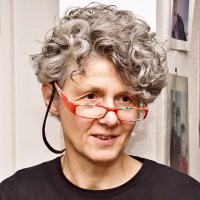

 Firecrackers! For a prize from the Swedish royal academies, something you might think of as a Nobel Prize’s little brother, awarded to two colleagues in linguistics and philosophy, one an old friend (and exact contemporary) of mine. From the website of the Swedish royal academies, “Science, art and music meet in the Rolf Schock Prizes 2024”, a press release of 3/14/24:
Firecrackers! For a prize from the Swedish royal academies, something you might think of as a Nobel Prize’s little brother, awarded to two colleagues in linguistics and philosophy, one an old friend (and exact contemporary) of mine. From the website of the Swedish royal academies, “Science, art and music meet in the Rolf Schock Prizes 2024”, a press release of 3/14/24:
2024 Rolf Schock Prize in Logic and Philosophy is jointly awarded Hans Kamp, University of Stuttgart, Germany and Irene Heim, Massachusetts Institute of Technology, Cambridge, USA
“for (mutually independent) conception and early development of dynamic semantics for natural language.”
Natural languages are highly context-dependent – how a sentence is interpreted often depends on the situation, but also on what has been uttered before. In one type of case, a pronoun depends on an earlier phrase in a separate clause. In the mid-1970s, some constructions of this type posed a hard problem for formal semantic theory.
Around 1980, Hans Kamp and Irene Heim each separately developed very similar solutions to this problem. Their theories brought far-reaching changes in the field. Both introduced a new level of representation between the linguistic expression and its worldly interpretation and, in both, this level has a new type of linguistic meaning. Instead of the traditional idea that a clause describes a worldly condition, meaning at this level consists in the way it contributes to updating information. Based on these fundamentally new ideas, the theories provide adequate interpretations of the problematic constructions.
Kamp was born in the Netherlands in 1940. He received his PhD from University of California, Los Angeles, in 1968 and has been a professor at University of Stuttgart, Germany, since 1988.
(#1) Hans Kamp (photo: Kerstin Sänger)Heim was born in Germany in 1954. She received her PhD from the University of Massachusetts, Amherst, in 1982 and has been a professor at the Massachusetts Institute of Technology (MIT), Cambridge, USA since 1997.
About the prize.
The Rolf Schock Prize is unusual in that it rewards both logic and philosophy, mathematics, visual arts and music. The laureates are selected through a unique collaboration between three Swedish royal academies: the Royal Swedish Academy of Sciences, the Royal Academy of Fine Arts and the Royal Swedish Academy of Music. The final decision is made by The Schock Foundation.
Hans Kamp. A friend since we were fellows together at the Center for Advanced Study in the Behavioral Sciences in 1981-82. Now, from John Beavers (chair of the UT-Austin linguistics department) on Facebook on 3/18, we hear that HK has been able to continue presenting his ideas in courses at Texas:
Huge congrats to our colleague and friend Hans Kamp on this amazing award! Hans was full-time faculty at UT Philosophy in the mid-1980s, and since 2009 has been with us in Linguistics as well as Philosophy as a Visiting Professor. This prize is richly deserved, a recongition of the foundational work he has done on formal semantics and the modeling of discourse. Working closely with Hans over these years has been a highlight of my time at UT, and it’s wonderful to see his life’s work recognized in this way. … our announcement from Linguistics at The University of Texas at Austin:
Please join us in congratulating our colleague Professor Hans Kamp, who has just been awarded the prestigious Rolf Schock Prize in Logic and Philosophy by the Royal Swedish Academies of Science, Music and Fine Arts!
Hans shares this year’s prize with Prof. Irene Heim (MIT). … the prize is for Hans’s creation of Discourse Representation Theory (DRT), a landmark in formal semantics. Alongside Irene Heim’s File Change Semantics, DRT was one of the first serious attempts to build a model of semantics that takes discourse into account and thus handle meanings across sentences, and it’s something Hans has continued to develop in the intervening years, with many important papers and a textbook. It is fair to say that there is not a single working semanticist in the world who is not intimately familiar with DRT, and there are many who continue to actively use the framework.
Coincidentally, Hans arrives in Austin today for his annual visit to the UT departments of Linguistics and Philosophy, and so all of us here in Austin will be able to congratulate him in person. He will be teaching a 5-week intensive course on Speech Act Theory, to which all are welcome.




